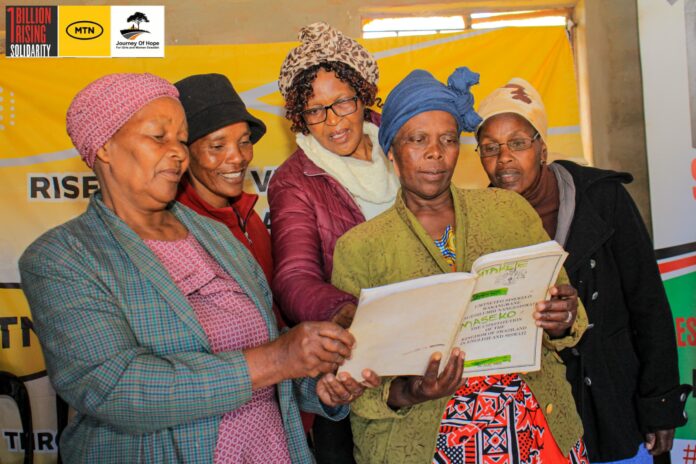The women of Eswatini in the communities are raising their voices louder than ever before.
Once confined by layers of silence, cultural expectation, and systemic inequality, many women at community level are declaring that their constitutional rights and freedoms cannot be traded for anything, not for tradition, not for male approval, and certainly not for the comfort of the status quo.
This powerful stance is rooted in a growing wave of awareness among Eswatini women, many of whom are being educated on their constitutional rights for the very first time.
For some, this education has brought a sense of empowerment and hope. For others, it has highlighted the painful reality that while the Constitution may grant rights, patriarchy and toxic cultural practices often deny them in practice.
Through the One Billion Rising (OBR) Community Circles, women are coming together not just to share their stories, but to rewrite them. At the heart of these gatherings is a common realisation is that the Constitution guarantees rights and freedoms to women that many never knew existed.
Women in Eswatini have live under the heavy shadow of patriarchy and deeply embedded patriarchal cultural norms. In such a context, talking about rights let alone claiming them has often been seen as inappropriate or even dangerous. But within the safe, inclusive spaces of the OBR Community Circles, a new kind of awareness is blooming.
Women are discovering their constitutional rights, and with that knowledge comes strength, unity and transformation.
A Movement Rooted in Empowerment
One Billion Rising, a global campaign to end violence against women and girls, has made significant inroads in Eswatini.
The community circles, led by local activists, are at the forefront of the movement’s grassroots strategy.
They offer a unique platform for education, healing, and mobilisation. Many women attending these sessions report that it’s the first time they’ve ever heard that they have constitutional rights to equality, dignity, protection from violence and access to land and property.
“We really appreciate to get this empowerment because in my chiefdom we have never had this opportunity to be empowered on our constitutional rights,” said Samaria Hleta, a member of the Dlovunga community circle in the Shiselweni region.
This sentiment echoes across the country. The women who participate in these circles express deep appreciation for the legal literacy they are receiving. They are learning to identify violations of their rights and speak out against them. And perhaps most importantly, they are learning that they are not alone.
From Silence to Solidarity
The community circles are about more than legal texts, they’re about community-led transformation.
Women share personal experiences of abuse, discrimination and marginalisation. They discuss customary practices that have harmed them or stripped them of property, voice, or autonomy. In doing so, they begin to connect the dots between personal struggles and systemic injustice.
“We Will Not Bargain with Our Freedom”- says women at community level
What’s emerging is a bold, collective voice among women who now understand that their rights are not favours, they are entitlements. The women in the community circles have begun to organize, speak out against the violations of their rights. Their message is clear: our constitutional rights are non-negotiable.
This declaration stands in stark contrast to traditional beliefs that continue to dominate parts of Eswatini society, where women are still seen as subordinates to men and expected to conform to cultural norms, regardless of the law.
The Weight of Patriarchy and Culture
Despite their newfound knowledge, many women continue to face deep-seated structural barriers that prevent them from fully exercising their rights. Eswatini’s dual legal system where statutory law exists alongside customary law, often leaves women trapped between two conflicting worlds. Under customary practices, men still dominate decision-making at all levels. Chiefs, who govern rural areas, enforce traditions that routinely disadvantage women: land inheritance is passed through male lineage and women need male permission to access land or loans.
These practices are not only culturally normalised; they are socially enforced. Women who challenge them are often accused of being disrespectful, ungrateful, or even “un-Swazi. This cultural gatekeeping has left many women disillusioned. They feel that their rights are repeatedly denied, not because they are unaware of them, but because society refuses to honour them.
The One Billion Rising Community Circles are beginning to bridge the gap between knowledge and action, but systemic change is still needed. Education is only the first step; implementation, enforcement and cultural transformation must follow. Chiefs and traditional leaders must be trained to understand and uphold the Constitution.
Law enforcement officers must take women’s rights seriously, and justice institutions must be accessible to all, especially rural women. At the same time, cultural reform must be driven from within communities.
Women involved in OBR circles are beginning to engage traditional leaders and challenge harmful practices, not to reject Swazi culture, but to reclaim it in a way that honors both tradition and human dignity.
The transformation unfolding through One Billion Rising Community Circles is not just about rights on paper, it’s about a rising tide of consciousness. Women are learning, organising, and pushing back against centuries of silence.
They are saying, with clarity and conviction, that their constitutional rights are not optional, and not up for negotiation. They appreciate the education, but more than that, they are demanding a society that lives by the Constitution, not just one that writes it.








